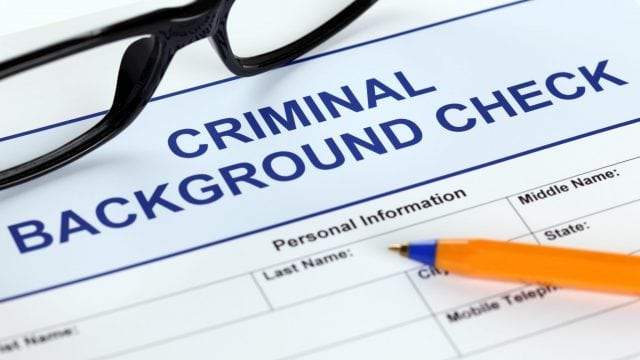 This complete guide on how to expunge your criminal record in Bergen County has been created for those who are interested in expunging their criminal record in Bergen County, New Jersey. Currently, the New Jersey expungement process should take approximately six months to complete. The procedure has been broken down into the following eight steps.
This complete guide on how to expunge your criminal record in Bergen County has been created for those who are interested in expunging their criminal record in Bergen County, New Jersey. Currently, the New Jersey expungement process should take approximately six months to complete. The procedure has been broken down into the following eight steps.
Step 1. Obtain Your Criminal Dispositions
You will first need to request a copy of your criminal records. If you are requesting a record from a New Jersey Municipal Court, the name of the document you will want to request is the “Disposition.” If you are requesting your record from a New Jersey Superior Court, the name of the record to request is the “Judgment of Conviction.” In order to draft your expungement application, you will need the information contained on these documents.
The best way to obtain these documents is to request them directly from the court. If you are able to personally appear with proper ID to request the record(s), you will usually be given a copy that same day.
If you cannot appear in person, however, you will need to request the record(s) in writing. Before doing so, it is recommended that you contact the Criminal Records Department of whichever court you will be requesting the record from and ask what the proper procedure is, as this will vary by court. Some courts may require that you pay a small copying fee (usually $5.00), while others do not. Almost all courts, however, will ask that you fill out a New Jersey Record Request Form and then fax or mail it to them.
For a directory of the Superior Courts in New Jersey, click here. Make sure that your record request is addressed to the attention of the Criminal Records Department.
If you are requesting records from the Bergen County Superior Court, you can either mail or fax your request to the Bergen County Superior Court at:
Bergen County Superior Court
Attn: Criminal Records Department
Justice Center
10 Main Street
Hackensack, NJ 07601
Phone: 201-527-2409
Fax: 201-371-1122
For a directory of Municipal Courts in New Jersey, click here.
When you write for a copy of your record in this manner, you should know that it could take anywhere from a couple of days to four weeks before you receive your record, depending on the court.
Be Sure to Request ALL of your Records! It is very important that you ensure that you are requesting a copy of the Disposition/Judgment of Conviction for all of the offenses on your criminal record. When you apply for an expungement, you are required to disclose absolutely all offenses on your record. This includes out of state arrests, minor arrests such as municipal ordinance violations, offenses that were dismissed or expunged, and DWI offenses in those states where they are considered criminal.
If you neglect to include information relating to all of your arrests, then either you (or your attorney if you are represented by one) will need to amend and refile your expungement paperwork if the prosecutor assigned to review your expungement application objects on the basis that you did not disclose your entire record. This would not only result in a significant delay but you may not be eligible for expungement at all.
Thus, if you are not entirely sure of what your criminal history consists of, we recommend that you undergo an FBI background check before moving forward with your expungement. For further details on how to obtain an FBI Background Check report, click here.
You should note that the time frame for expungement eligibility begin to run on the date that the petitioner completed their sentence – which includes payment of fines and completion of probation, whichever is later. If you cannot recall when you completed probation, contact the probation department. The Bergen County Probation Department can be reached at:
Bergen County Probation Department
10 Main Street, Building 39
Hackensack, NJ 07601
Phone: (201) 527-4000
Fax: (201) 527-4090
Step 2. Prepare the Expungement Application.
After you have received your criminal records, the next step is to begin filling out the proper paperwork to file with the court. In order to begin the expungement process, you will need to draft the following four documents.
- Filing Letter
The filing letter should notify the court that you are seeking an expungement and enclose the documents listed below.
- Expungement Petition
The Expungement Petition is document that asks the court to expunge your records. As explained above, you need to be sure to disclose your entire record on the petition. For each arrest, you need to provide as much information as possible including the date of the arrest, which police department charged you, where you were arrested, what you were charged with, any complaints or indictment numbers, in which the court the matter was resolved, on which date the matter was resolved, the final outcome, and sentencing information. You will also need to include your social security number and your date of birth.
The very last page of the Expungement Petition should be entitled “Verification.” The Verification page will need to be signed and notarized.
- Hearing Order
The Hearing Order will be completed by the court and will set forth the hearing date. You, however, will need to fill out your personal information and list the agencies that you will be sending copies of the expungement application to.
- Expungement Order
The Expungement Order is a document that, at the end of the process, will be signed by the judge assigned to handle you case. In the Expungement Order, the judge will sign off either granting or denying your expungement. Again, however, you will need to fill out the portion of this document containing your personal information.
You must be careful and fill out these forms accurately in order to prevent your expungement from being rejected and/or returned to you. If you hired a lawyer to handle your expungement, your lawyer will request the necessary records and draft the expungement paperwork for you. If you are not represented by a lawyer, the New Jersey Judiciary has prepared a packet containing forms that you can use for reference.
Step 3. File Your Expungement Application.
The documents described above must then be filed with the New Jersey Superior Court in the county where your offense took place. You should file an original and two copies of each document with the Superior Court. You should also be sure to keep a copy of the paperwork for your records. You also need to provide the court with two stamped return envelopes. This is because the court will need to return the Hearing Order and Expungement Order to you eventually.
Finally, be sure to enclose the proper filing fee. Currently, the filing fee is $75.00.
The filing address for the Bergen County Superior Court is as follows:
Clerk, Superior Court of New Jersey, Criminal Division
Bergen County Superior Court
10 Main Street
Hackensack, NJ 07601
Phone: 201-527-2400
Step 4. Serve the Hearing Order.
Approximately 4-6 weeks after you file the expungement application with the Superior Court, the Court Clerk will return to you a copy of your paperwork stamped filed. The filed paperwork will also contain your expungement’s docket number, which is simply the file number assigned to you case. The docket number should be provided on all future correspondence to the court or any other agency. The Court Clerk will also provide you with a copy of the executed Hearing Order, which contains your scheduled hearing date.
No later than 5 days after receiving the Hearing Order, you will need to serve a copy of the filed paperwork (including the Expungement Petition, the Hearing Order, and the Expungement Order) on the requisite agencies. You should serve the agencies by Certified Mail, Return Receipt Requested. The expungement application must be serve on each of the following agencies, as applicable:
- The Attorney General;
- The New Jersey State Police;
- The County Prosecutor(s);
- If any of your offenses were resolved in Municipal Court, the Court Clerk of the Municipal Court(s);
- The Chief of Police of the police department(s) where any offenses took place;
- The Chief of Police of any other law enforcement agenc(ies) that were involved;
- The County Probation Department;
- The Division of Criminal Justice (for Grand Jury cases);
- The Warden or Superintendent of any institution where you were incarcerated; and
- The County Family Division (if you are requesting the expungement of any juvenile delinquency matters).
Step 5. File Proof of Service with the Court.
The Proof of Service is a document that verifies that you served all of the applicable agencies with your expungement application. Once you receive back the green cards for each of the agencies you served, you will need to enclose those green cards along with Proof of Service and send it to the court.
Step 6. Appear at the Hearing, if Required.
Court appearances are usually not required for expungement cases, although they may be in some cases. Contact the court prior to your scheduled hearing date to see whether an appearance in required.
On the hearing date (whether an appearance is required or not) the judge will decide whether or not to grant or deny your expungement. The court’s decision will be memorialized on the Expungement Order, which the court will give to you in person at the hearing or, if no appearance was required, will mail to you.
Step 7. Served the Expungement Order on the Applicable Agencies.
After you receive the Expungement Order, assuming your expungement was granted, you will need to serve a copy of the final order (again by Certified Mail) to each of the applicable government agencies. This lets the agencies know that your expungement was granted and directs them to remove the expunged records from their public databases.
Step 8. Wait.
Finally, after you have served the Expungement Order on the requisite agencies, you will need to wait until you receive final confirmation that your records were removed from all of the agencies’ public databases. This letter will come from the New Jersey State Police and will take between 3-4 months to receive. Keep this letter for your records as it is proof that your expungement was successful.
Expungement Resources
New Jersey Expungement Statutes
New Jersey County Prosecutor’s Offices – The Bergen County Prosecutor’s Office can be reached at:
Bergen County Prosecutor
10 Main Street
Hackensack, NJ 07601
Phone: (201) 646-2300
Fax: (201) 646-3794
New Jersey Superior Court Family Division Offices – The Bergen County Family Division can be reached at:
Bergen County Superior Court, Family Division
10 Main Street
Hackensack, NJ 07601
Phone: 201-527-2300
Fax: 201-371-1137
New Jersey Expungement Pro Se Packet
Bergen County Expungement Lawyer
If you can afford to hire a lawyer to handle your expungement, we highly recommend doing so. The procedural rules covering expungements in New Jersey can be quite complicated. Moreover, if your expungement is more complex, we strongly recommend that you hire an attorney to represent you. Complex expungements include those where the petitioner has more than three offenses, where the petitioner is applying for an early pathway or public interest expungement, or where they are trying to expunge a conviction for possession of CDS with the intent to sell or distribute. The prosecutor assigned to review your expungement will usually object in these situations, which means that a legal brief and/or a court appearance will most likely be required.
Affordable Bergen County Expungement Lawyers
The experienced expungement lawyers at Katherine O’Brien Law offer affordable flat rate fees for our Bergen County expungement services. Our expungement fees are only $895.00. Moreover, these fees are all inclusive. We also offer flexible payment plans and will start working on your case for as little as $350.00 down.
Moreover, we represent clients in every city in Bergen County, New Jersey, including: Allendale, Alpine, Bergenfield, Bogota, Carlstadt, Cliffside Park, Closter, Cresskill, Demarest, Dumont, East Rutherford, Edgewater, Elmwood Park, Emerson, Englewood, Englewood Cliffs, Fair Lawn, Fairview, Fort Lee, Franklin Lakes, Garfield, Glen Rock, Hackensack, Harrington Park, Hasbrouck Heights, Haworth, Hillsdale, Ho Ho Kus, Leonia, Little Ferry, Lodi, Lyndhurst, Mahwah, Maywood, Midland Park, Montvale, Moonachie, New Milford, North Arlington, Northvale, Norwood, Oakland, Old Tappan, Oradell, Palisades Park, Paramus, Park Ridge, Ramsey, Ridgefield, Ridgefield Park, Ridgewood, River Edge, River Vale, Rochelle Park, Rockleigh, Rutherford, Saddle Brook, Saddle River, South Hackensack, Teaneck, Tenafly, Teterboro, Upper Saddle River, Waldwick, Wallington, Washington Township, Westwood, Woodcliff Lake, Wood-Ridge, and Wyckoff.
If you have additional questions about how to expunge your criminal record in Bergen County, contact Bergen County Expungement Lawyer Katherine O’Brien today for a free Expungement Analysis Session. You can reach us at 856-832-2482.







